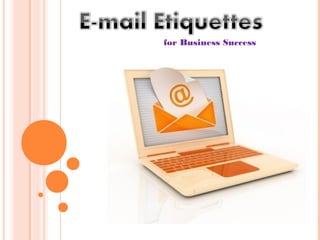E mail Etiquettes for Business Success
- 2. OVERVIEW ’ā╝ Gone are the days when business dealings were primarily handled in-person or over the phone; email is the preferred method of communicating in today's business environments. ’ā╝ Email communication gives businesses a quick way to send messages to clients and colleagues. ’ā╝ When conducting business via email, it's important for users to exercise etiquette
- 3. WHILE FRAMING A BUSINESS MAIL ’ā╝ ’ā╝ ’ā╝ ’ā╝ ’ā╝ ’ā╝ ’ā╝ ’ā╝ ’ā╝ ’ā╝ Use Descriptive And Meaningful Subject Line Write Clear And Concise Message Scan Attachments Avoid Using Emoticons Avoid Sending Forwards And Inappropriate Jokes Use Email Signature Respond to Emails in Timely Fashion Know When to Email and When to Call Be clear and precise DonŌĆÖt use CAPITAL words
- 6. POINTS TO REMEMBER WHILE MAILING
- 8. PREPARING THE EMAIL ’ā╝ ’ā╝ Business emails should follow many of the guidelines used for written communication. Avoid abbreviations, such as "plz," and emoticons, such as a smiley face.
- 9. CONTD.. ’ā╝ Capital letters are reserved for emphasis, since their use is considering yelling in the Internet culture. ’ā╝ Make emails concise and easy-to-read by writing a descriptive subject line, utilizing bullet points and summarizing key points. ’ā╝ Always use proper grammar and spelling.
- 10. SENDING THE EMAIL ’ā╝ Think twice before hitting the "send" button. Emails are a form of communication that can be seen by anybody down the road. ’ā╝ Only copy people on a need-to-know basis to avoid overwhelming a user with unnecessary information. ’ā╝ Also remember that sensitive topics are often better addressed via the phone or in-person.
- 11. RESPONDING TO EMAIL ’ā╝ Email correspondents often expect immediate responses. ’ā╝ To manage this expectation, create an out-of-office message with alternate contact information when you will be unavailable. ’ā╝ Otherwise, answer emails within a reasonable timeframe. It is helpful to include a phone number as part of your salutation to enable recipients to easily connect with you in this manner.
- 12. SHARING EMAIL ’ā╝ An email sender expects that his address won't be shared for unapproved purposes, even if it is not formalized in a privacy policy. ’ā╝ The sender also has a responsibility to not include sensitive information, such as credit card information, that might be inappropriately used by an unintended party.
- 13. USING COMPANY RESOURCES ’ā╝ Emails transmitted at work are subject to the company's policies. ’ā╝ It is usually unacceptable to send jokes and chain emails. ’ā╝ Limit personal email correspondence and use a professional email address if you get to choose one.
- 15. COMPONENTS OF AN E-MAIL

















